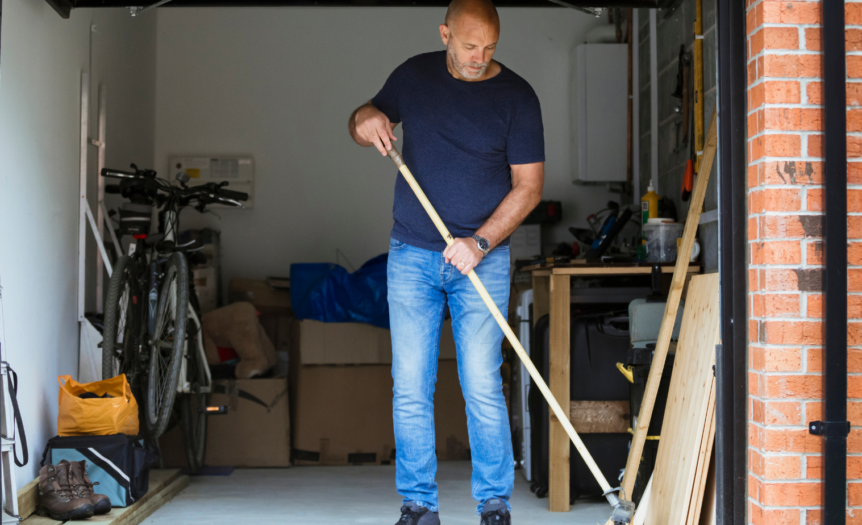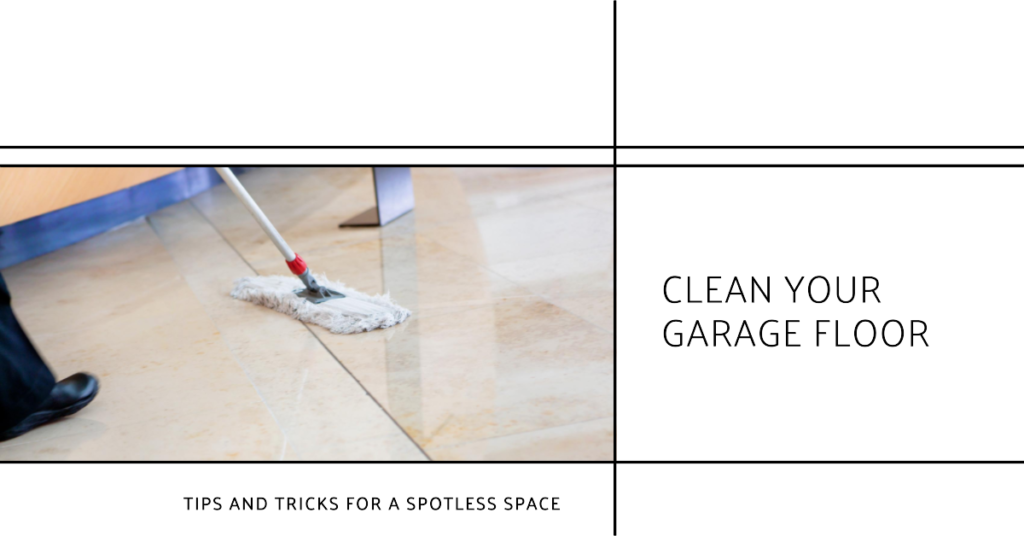A clean garage floor not only improves the aesthetic of your home but also helps maintain a safe and functional space. With various stains, spills, and dirt accumulating over time, it’s essential to know how to effectively clean different types of garage floors.
We will now go over several methods for tackling oil stains, rust marks, and more while providing cost-effective cleaning solutions that will leave your floor looking pristine.
Key Takeaways
- High-pressure hose and concrete degreaser is an effective and budget-friendly way to clean the garage floor.
- Regular cleaning, maintenance, and applying a sealant can prevent future stains and dirt build-up.
- Using mats or rugs in high-traffic areas and avoiding heavy equipment on the surface can help preserve your garage floor’s lifespan.
Best Methods To Clean A Garage Floor
The most effective methods for cleaning a garage floor include using a high-pressure hose and concrete degreaser, baking soda and water solution, vinegar and lemon juice for rust stains, a stiff-bristled brush with degreaser, or even investing in a garage floor cleaning machine.
High-pressure Hose And Concrete Degreaser
One of the most effective and budget-friendly ways to clean your garage floor is using a high-pressure hose paired with a concrete degreaser. This powerful combination not only removes dirt, grime, and oil stains faster than standard methods but also requires less elbow grease.
After letting it sit for the recommended amount of time (usually 10-15 minutes), blast away all those loosened particles and cleaning solution residue with your high-pressure hose.
The forceful stream of water easily lifts contaminants from the grooves in textured floors or even smooth surfaces, leaving behind a pristine garage space you can be proud of.
Baking Soda And Water Solution
A baking soda and water solution is an effective and low-cost method for regular cleaning of garage floors. This solution helps to loosen dirt, grease, and grime quickly.
To use this method, mix baking soda with warm water and scrub the floor using a stiff-bristled brush or mop.
Baking soda is a natural cleaning agent that can remove unpleasant odors from your garage in addition to being an excellent cleaner. It’s safe for most surfaces as it won’t scratch or damage them when used correctly.
Moreover, baking soda won’t leave any harmful residues behind after cleaning your garage floor because it’s non-toxic and eco-friendly.
Vinegar And Lemon Juice For Rust Stains
Another effective method for cleaning rust stains off garage floors is to use white vinegar and lemon juice. These household ingredients contain high levels of natural acid, which can break down rust particles effectively.
To get the best results with this method, mix an equal amount of white vinegar and lemon juice in a spray bottle and apply it directly onto the stain area. Allow the solution to sit on the surface for about 10 minutes before scrubbing gently with a stiff-bristled brush.
It’s important to note that while this method is effective against rust stains, it may not be suitable for other types of stains on your garage floor.
Stiff-bristled Brush And Degreaser
One effective method for cleaning a garage floor is by using a stiff-bristled brush and degreaser. This technique works particularly well to remove stubborn oil stains on concrete floors.
First, use the stiff-bristled brush to scrub away any loose debris or dirt from the surface of the floor. Next, apply a good quality degreaser directly onto the stain and let it sit for a few minutes before aggressively scrubbing with the stiff-bristled brush again.
It’s important to wear proper protective gear such as gloves and eye protection when working with strong chemicals like degreasers. Always follow manufacturer instructions carefully and avoid using harsh chemical substances that could damage your garage floor or harm the environment.
Garage Floor Cleaning Machine
A garage floor cleaning machine can be a great investment if you want to thoroughly clean your garage floor quickly and efficiently. These machines use powerful motors and rotating brushes to scrub away dirt, grime, and oil stains from the concrete surface.
Most of them come with adjustable pressure settings that allow you to customize the cleaning intensity based on the level of buildup on your garage floor.
When using a garage floor cleaning machine, it’s important to choose one that is compatible with your flooring type, as some models may not work well with painted or epoxy-coated floors.
Additionally, it’s best to read and follow all instructions carefully before beginning operation. Regular maintenance of the machine is essential for long-lasting use, so make sure to clean and store it properly after each use.
How To Clean Various Types Of Garage Floors
This section will provide specific instructions for cleaning unsealed concrete floors, painted garage floors, and epoxy-coated garage floors.
Unsealed Concrete Floors
Unsealed concrete floors are common in most garages, and they require a different cleaning approach than painted or epoxy-coated surfaces. The best way to clean unsealed concrete floors is by using a high-pressure hose with a concrete degreaser solution and a stiff-bristled brush.
First, clear the floor of any debris or objects, then sweep it thoroughly before applying the concrete cleaner.
It’s important to note that you should avoid using harsh chemicals on unsealed concrete floors as they can damage the surface over time. Instead, opt for natural solutions such as baking soda and water or white vinegar for regular cleaning purposes.
Keeping an unsealed concrete floor clean requires regular maintenance, especially if you have heavy traffic in your garage.
Painted Garage Floors
Painted garage floors require special care when cleaning to avoid damaging the paint. It’s important to use a gentle, non-abrasive cleaner that won’t strip the paint off the floor.
To prevent future damage, it’s recommended to sweep regularly and avoid heavy equipment and vehicles on the surface. If you need to park cars or other equipment in your garage, consider laying down protective mats or rugs underneath them.
Remember always follow up-to-date safety guidelines when using chemicals for their intended purposes.
Epoxy-coated Garage Floors
Epoxy-coated garage floors are a popular choice for homeowners who want to give their garage floor a sleek and polished look. The epoxy coating protects the concrete from stains, oil spills, and other types of damage.
To clean an epoxy-coated garage floor, start by sweeping up any loose debris with a broom or vacuum. Then use a mild detergent or degreaser mixed with water to gently scrub the surface.
Regular cleaning is essential to keep your epoxy-coated garage floor looking its best. You should also avoid dragging heavy objects across the surface as this can cause scratches and damage to the coating.
Preventing Future Stains And Dirt Build-Up
To prevent future stains and dirt build-up on your garage floor, consider regular cleaning and maintenance, parking vehicles outside, using mats and rugs to catch debris and spills, and applying a sealant for added protection.
Regular Cleaning And Maintenance
Keeping your garage floor clean requires regular cleaning and maintenance to prevent dirt buildup, stains, and damage. You can sweep the floor daily using a stiff-bristled broom or a specialized mop to remove loose debris before it accumulates.
To maintain your garage floor, you should choose suitable cleaning products depending on the floors’ type and condition. Degreasers work well for oily surfaces, while mild detergents are effective in removing general grime and dirt.
By investing time into regular cleaning practices and preventative measures such as mats or rugs beneath vehicles parked inside garages, you’ll prolong your garage floor’s lifespan while keeping it looking new longer.
Park Vehicles Outside
One way to prevent future stains and dirt buildup on your garage floor is by parking vehicles outside. Cars, trucks, and motorcycles often leak oil, transmission fluid, or other chemicals that can be harmful to your garage floor.
These substances can also attract dirt and grime that may be difficult to remove later.
If you must park inside the garage, consider using mats or rugs under each vehicle to catch any spills or leaks. You can easily wash these mats down regularly and prevent damage to your concrete floors underneath.
Additionally, applying a sealant to your concrete floors will help resist future stains from oil spills and other chemicals.
Use Mats And Rugs
Another way to prevent future stains and dirt build-up on your garage floor is by strategically placing mats and rugs in high-traffic areas. Mats and rugs can help absorb oil spills, dirt, and other debris that may accumulate on your garage floor over time.
Consider using rubber-backed mats or industrial-grade carpet tiles for added durability. These materials are resistant to grease, oil, water, and other common substances found in garages.
By incorporating mats and rugs into your garage cleaning routine along with regular cleaning and maintenance tasks like sweeping, vacuuming, scrubbing, rinsing, drying the floor as mentioned before in this article; you can keep your garage floors clean longer while protecting them from damage caused by heavy foot traffic or equipment.
Apply A Sealant
After cleaning your garage floor, it’s essential to apply a sealant to protect the surface and prevent future stains and dirt build-up. The best type of sealant for an unsealed concrete floor is a penetrating sealer that gets deep into the pores of the concrete, creating a barrier against water, oil spills, and other contaminants.
Applying a sealant is easy; just make sure your floor is clean and dry before starting. Use a roller or sprayer to apply the sealer evenly across the entire surface. Apply multiple coats if necessary, following the manufacturer’s instructions.
Steps To Clean Your Garage Floor
The five steps to effectively clean your garage floor include clearing the area, sweeping and vacuuming debris, treating stains and spills, scrubbing and rinsing with appropriate solutions, and allowing the floor to dry completely.
Clear The Floor
Before you start cleaning your garage floor, it’s essential to clear the area of any clutter or debris. Any items, such as bikes, tools, or boxes, should be removed from the surface so that they don’t get in the way while you’re cleaning.
Once all items have been cleared off the floor surface, take some time to inspect for any stains or marks on the concrete before starting proper cleaning. You can use a stiff-bristled brush with a bit of water to loosen stuck-on dirt and grime that has become embedded on your garage floors.
Using this step as an opportunity to organize items in your garage can also help prevent future messes by ensuring everything has its own designated spot.
Sweep And Vacuum The Floor
The first step in cleaning your garage floor is to clear any debris and sweep or vacuum thoroughly. This ensures that dirt, dust, and loose particles don’t get dragged around during the cleaning process.
Use a stiff-bristled broom or a vacuum with an attachment designed for hard floors.
A clean start makes the entire process much more effective and efficient. Ensure all corners are cleared of cobwebs, random rocks/pebbles/dirt as these can scratch the floor while scrubbing which may lead to even bigger problems in future maintenance.
Treat Stains And Oil Spills
If there are stains or oil spills on your garage floor, it’s essential to treat them before scrubbing or rinsing the entire area. One way to tackle oil spills is by using baking soda and water solution.
Pour some baking soda over the stain, let it sit for 10-15 minutes, then pour hot water over it and scrub with a stiff-bristled brush. Another option is to use a degreaser specifically designed for concrete surfaces.
For rust stains caused by metal objects left on the garage floor, you can create a mixture of white vinegar and lemon juice in equal parts. Apply this mixture directly onto the rust stain and leave it for about an hour before scrubbing vigorously with a stiff-bristled brush.
Remember that prompt action when dealing with stains will help prevent further damage to your garage floor’s surface.
Scrub And Rinse The Floor
After treating any stains or oil spills on your garage floor, it’s time to scrub and rinse the floor to remove dirt and debris. Use a stiff-bristled brush with your chosen cleaning solution and scrub the entire surface thoroughly.
Once you’re done scrubbing, rinse off the cleaning solution with water using a hose or pressure washer. Make sure all soap residue is washed away as soap can attract dirt.
Don’t forget to dry off your garage floor after rinsing it so that no new dirt will accumulate while it’s drying up.
Dry The Floor
Once you have scrubbed and rinsed your garage floor, it’s important to dry it properly. A wet floor can be hazardous and slippery, so ensuring that the floor is dry will prevent accidents from occurring.
One way to dry a garage floor is by using a squeegee or mop.
Another crucial step in drying your garage floor is allowing ample time for it to air-dry completely. This may take several hours depending on weather conditions like humidity and temperature.
Regularly cleaning your garage floor with simple tools and solutions like degreasers, brushes, vinegar, lemon juice or baking soda solution after parking vehicles outside can help maintain its quality.
Conclusion
Cleaning your garage floor doesn’t have to be a daunting task. By following the outlined steps and using the appropriate tools and cleaning solutions, you can keep your garage floor looking clean and well-maintained for years to come.
Remember to regularly sweep, vacuum, and treat any stains or oil spills promptly. Additionally, take preventative measures like parking vehicles outside and using protective mats or rugs.
FAQs:
1. What materials do I need to clean my garage floor?
To clean your garage floor, you will need a broom or vacuum cleaner, a mop or scrub brush, a bucket, and cleaning solution specifically designed for concrete surfaces.
2. Can I use regular household cleaners to clean my garage floor?
No, you should not use regular household cleaners on your garage floor as they may contain harsh chemicals that can damage the surface of the concrete. Instead, use specialized cleaning solutions that are safe for concrete surfaces.
3. How often should I clean my garage floor?
The frequency with which you need to clean your garage floor will depend largely on how much traffic it sees and how dirty it gets over time. However, generally speaking, it’s recommended to give your garage floor a thorough cleaning at least once every six months.
4. Is pressure washing an effective way to clean my garage floor?
Yes! Pressure washing is one of the most effective ways to deep-clean a concrete surface like a garage floor. Just be sure to use appropriate safety gear such as gloves and eye protection when operating a pressure washer, and avoid using too high of pressure so as not to damage the concrete surface itself.
Related Posts
How to get rid of flies in garage
How to cool a garage
How to get rid of mice in garage
How to lubricate a garage door
How to heat a garage
How much to epoxy garage floor
How to paint garage door
Why do garage doors open by themselves









